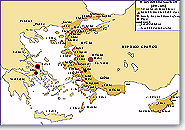

 | |
|
The revolt having been declared, Aristagoras sought help from the cities of mainland Hellas. But only Athens and Eretria responded to his call, sending twenty and five ships respectively. Athens' assistance to the Ionians was token. By joining forces with the Ionians the Athenians may have wanted to preempt the restoration of tyranny, since Hippias, the ex-tyrant of Athens, was trying to gain Persian support and recover his power. Initially, the rebels' fleet defeated that of the Persians, off the coast of Pamphylia, and Aristagoras' brother Charopinus captured Sardis, in the spring of 498 B.C. The city and the temple of Cybele were set on fire, but the Hellenes retreated and suffered defeat not far from Ephesus, in late summer.
After being defeated, Athens and Eretria left the Ionians in the lurch; but meanwhile the revolt had spread from the Hellespont to Cyprus. The Persians had by now begun to regroup their forces; and having occupied Cyprus and - despite valiant resistance - Caria, they launched an attack on Ionia, in 496 B.C. In 494 B.C., with all the other cities now taken, the Persian army and fleet laid siege to Miletus, where the rebel forces were concentrated. At the sea battle of Lade, offshore from Miletus, the Persian fleet defeated the Ionian fleet. Miletus was occupied and razed to the ground, its inhabitants being conducted into the inner part of the empire. Yet Darius treated the rebel cities with clemency. He did not reimpose tyrants, considering their policy to have been responsible for the revolt; did not increase the tribute; and - for the first time - introduced the institution of the land register. |  |
It was Athenian participation in the Ionian revolt (says Herodotus) that was the cause of the Persian Wars. More recent historians have however given greater weight to the expansionist dreams of the Great King and his wish to preempt a new uprising by neutralizing those cities of Hellas proper that had assisted the Ionians. Lastly, certain scholars have laid more emphasis on the machinations of Hellenes who, having taken refuge at the Persian court, pandered, for their own personal advantage, to Persian pugnacity. By their ultimate refusal to give "earth and water" to the Persian ambassadors, Athens and Sparta triggered the invasion of 490 B.C., which ended in the battle of Marathon.
|
| |
|
Note: Click on pictures to see a short description. | |